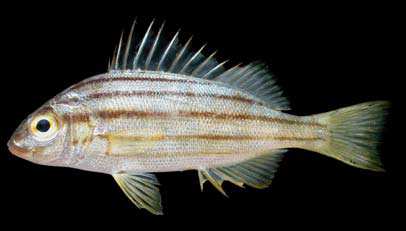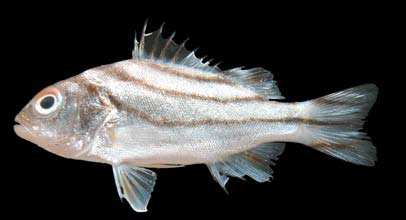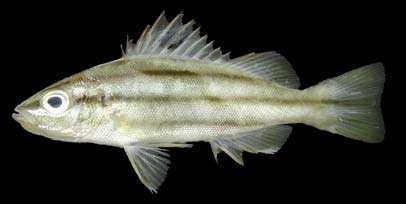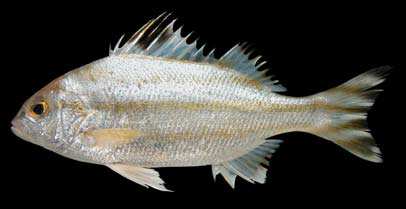TERAPONTIDAE
Grunters (Tigerperches)
By Ukkrit Satapoomin
 Pelates quadrilineatus |
 Terapon jarbua |
 Terapon puta |
 Terapon theraps |
|
Small to medium-sized (to 35 cm) perch-like fishes; body oblong and slightly to moderately compressed. Mouth moderate, protractile, upper jaw not extending beyond center of orbit; jaw teeth usually in villiform bands, shape of teeth conical, flattened, or tricuspidate; vomer and palatines toothless in adults of most species. Opercle bearing 2 spines, the lower one larger and stronger; posttemporal bone exposed and expanded posteriorly, with posterior margin serrate in some species. Dorsal fin single, notched, with XI-XIV spines and 8-14 soft rays; anal fin with III and 7-12 soft rays; pelvic fins inserted behind base of pectorals, with I spine and 5 soft rays; caudal fin usually emarginate. Scales adherent, finely ctenoid; lateral line single and complete, reaching on caudal fin. Color: body tan or light gray, often silvery in life with various dark markings; most marine species with 3 or more dark, straight or downwardly curved longitudinal stripes on body; some with dark transverse bands on lobes of caudal fin. Similar families occurring in the area. Serranidae: mouth large, with upper jaw typically reaching to below vertical through posterior margin of eye; caudal fin typically rounded; 3 strong spines on opercle. Kuhliidae: dorsal fin with X spines. Remarks. Coastal marine, brackish and freshwater in the Indo-West Pacific. Several species restricted to freshwater. Feed on fishes, insects, algae, and sand-dwelling invertebrates. |

|
|